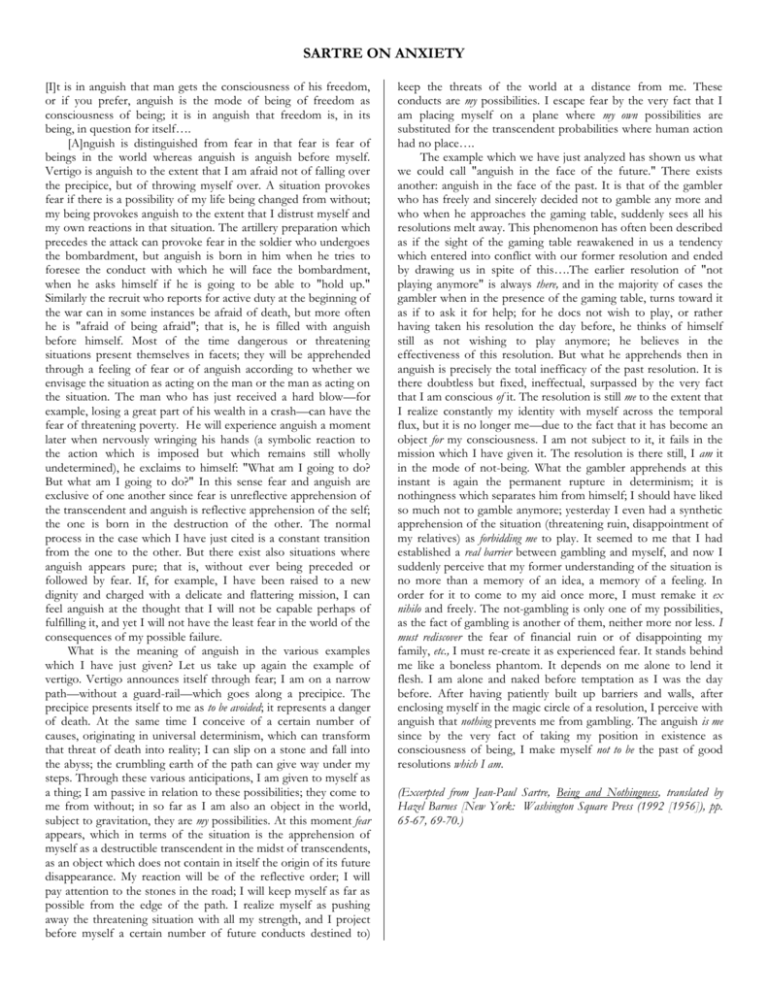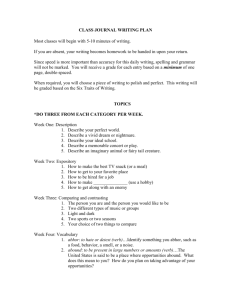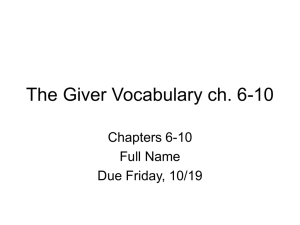Sartre on Anxiety
advertisement

SARTRE ON ANXIETY [I]t is in anguish that man gets the consciousness of his freedom, or if you prefer, anguish is the mode of being of freedom as consciousness of being; it is in anguish that freedom is, in its being, in question for itself…. [A]nguish is distinguished from fear in that fear is fear of beings in the world whereas anguish is anguish before myself. Vertigo is anguish to the extent that I am afraid not of falling over the precipice, but of throwing myself over. A situation provokes fear if there is a possibility of my life being changed from without; my being provokes anguish to the extent that I distrust myself and my own reactions in that situation. The artillery preparation which precedes the attack can provoke fear in the soldier who undergoes the bombardment, but anguish is born in him when he tries to foresee the conduct with which he will face the bombardment, when he asks himself if he is going to be able to "hold up." Similarly the recruit who reports for active duty at the beginning of the war can in some instances be afraid of death, but more often he is "afraid of being afraid"; that is, he is filled with anguish before himself. Most of the time dangerous or threatening situations present themselves in facets; they will be apprehended through a feeling of fear or of anguish according to whether we envisage the situation as acting on the man or the man as acting on the situation. The man who has just received a hard blow—for example, losing a great part of his wealth in a crash—can have the fear of threatening poverty. He will experience anguish a moment later when nervously wringing his hands (a symbolic reaction to the action which is imposed but which remains still wholly undetermined), he exclaims to himself: "What am I going to do? But what am I going to do?" In this sense fear and anguish are exclusive of one another since fear is unreflective apprehension of the transcendent and anguish is reflective apprehension of the self; the one is born in the destruction of the other. The normal process in the case which I have just cited is a constant transition from the one to the other. But there exist also situations where anguish appears pure; that is, without ever being preceded or followed by fear. If, for example, I have been raised to a new dignity and charged with a delicate and flattering mission, I can feel anguish at the thought that I will not be capable perhaps of fulfilling it, and yet I will not have the least fear in the world of the consequences of my possible failure. What is the meaning of anguish in the various examples which I have just given? Let us take up again the example of vertigo. Vertigo announces itself through fear; I am on a narrow path—without a guard-rail—which goes along a precipice. The precipice presents itself to me as to be avoided; it represents a danger of death. At the same time I conceive of a certain number of causes, originating in universal determinism, which can transform that threat of death into reality; I can slip on a stone and fall into the abyss; the crumbling earth of the path can give way under my steps. Through these various anticipations, I am given to myself as a thing; I am passive in relation to these possibilities; they come to me from without; in so far as I am also an object in the world, subject to gravitation, they are my possibilities. At this moment fear appears, which in terms of the situation is the apprehension of myself as a destructible transcendent in the midst of transcendents, as an object which does not contain in itself the origin of its future disappearance. My reaction will be of the reflective order; I will pay attention to the stones in the road; I will keep myself as far as possible from the edge of the path. I realize myself as pushing away the threatening situation with all my strength, and I project before myself a certain number of future conducts destined to) keep the threats of the world at a distance from me. These conducts are my possibilities. I escape fear by the very fact that I am placing myself on a plane where my own possibilities are substituted for the transcendent probabilities where human action had no place…. The example which we have just analyzed has shown us what we could call "anguish in the face of the future." There exists another: anguish in the face of the past. It is that of the gambler who has freely and sincerely decided not to gamble any more and who when he approaches the gaming table, suddenly sees all his resolutions melt away. This phenomenon has often been described as if the sight of the gaming table reawakened in us a tendency which entered into conflict with our former resolution and ended by drawing us in spite of this….The earlier resolution of "not playing anymore" is always there, and in the majority of cases the gambler when in the presence of the gaming table, turns toward it as if to ask it for help; for he docs not wish to play, or rather having taken his resolution the day before, he thinks of himself still as not wishing to play anymore; he believes in the effectiveness of this resolution. But what he apprehends then in anguish is precisely the total inefficacy of the past resolution. It is there doubtless but fixed, ineffectual, surpassed by the very fact that I am conscious of it. The resolution is still me to the extent that I realize constantly my identity with myself across the temporal flux, but it is no longer me—due to the fact that it has become an object for my consciousness. I am not subject to it, it fails in the mission which I have given it. The resolution is there still, I am it in the mode of not-being. What the gambler apprehends at this instant is again the permanent rupture in determinism; it is nothingness which separates him from himself; I should have liked so much not to gamble anymore; yesterday I even had a synthetic apprehension of the situation (threatening ruin, disappointment of my relatives) as forbidding me to play. It seemed to me that I had established a real barrier between gambling and myself, and now I suddenly perceive that my former understanding of the situation is no more than a memory of an idea, a memory of a feeling. In order for it to come to my aid once more, I must remake it ex nihilo and freely. The not-gambling is only one of my possibilities, as the fact of gambling is another of them, neither more nor less. I must rediscover the fear of financial ruin or of disappointing my family, etc., I must re-create it as experienced fear. It stands behind me like a boneless phantom. It depends on me alone to lend it flesh. I am alone and naked before temptation as I was the day before. After having patiently built up barriers and walls, after enclosing myself in the magic circle of a resolution, I perceive with anguish that nothing prevents me from gambling. The anguish is me since by the very fact of taking my position in existence as consciousness of being, I make myself not to be the past of good resolutions which I am. (Excerpted from Jean-Paul Sartre, Being and Nothingness, translated by Hazel Barnes [New York: Washington Square Press (1992 [1956]), pp. 65-67, 69-70.)







